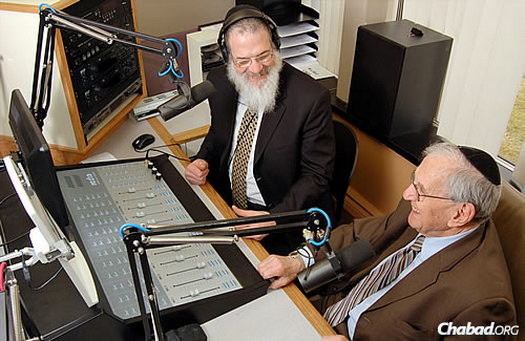
Rabbi’s Colorful Journey Inspires Radio Show
It’s been nearly 20 years since Rabbi Hershel Finman has been broadcasting the “Jewish Hour” every Sunday on Detroit’s WLQV-AM 1500.
Hosting Michigan’s only Jewish radio show, the rabbi makes sure to pack in a gamut of information, inspiration and music into every program. And his audience has responded with appreciation. His show has earned critical acclaim as well, with one of his broadcasts winning first place in the 2014 American Jewish Press Association’s annual journalism competition. Finman won the Simon Rockower Award for Excellence in a Multi-Media Story.
“I enjoy the interviews,” enthuses regular listener Gary Schuster, who missed no more than two shows since he first discovered the program in July of 2013, “but I most enjoy discussions on traditions, lifestyle and Torah because I was not raised with any of that, and it is like I am able to vicariously take part in the traditions and lifestyle. I also enjoy the Chassidic story at the end. This is not to say I do not enjoy all parts of the ‘Jewish Hour,’ which I do.”
For Schuster, who was raised as a Catholic and only discovered his Jewish parentage later in life, the show is “a constant reminder of how we are called by G‑d, and it helps me focus on the important things that will never end: the Torah.”
Finman’s Jewish journey is also quite colorful. He was raised in a traditional Jewish home in New Jersey, but decided early on that the answers to life’s questions could be found elsewhere. Four of his older siblings had been at Woodstock, and he was also a spiritual seeker, deeply immersed in the teachings of Buddhism.
When a Chassidic couple moved in downstairs, he began visiting them on a weekly basis, enjoying Shabbat dinners and lively debate on the merits of their divergent spiritual paths until well after midnight.
After years of Friday-night discussions, Finman began learning Tanya—a foundational work of Chabad philosophy—in order to understand his interlocutors’ position. In time, he began attending Shabbat services. “I was still quite careful not to get to close,” he recalls. “Buddhism was my journey.”
Nourish the Mind and Soul
It was transformative weekend in the Crown Heights neighborhood of Brooklyn, N.Y. that made all the difference.
“That Shabbat,” he recalls, “I was billeted with a modest Lubavitch family. In the middle of the meal, the phone began to ring. After about 20 rings, I asked the host if he was going to answer the phone; perhaps it was important. His response: ‘Maybe it’s not.’ A lightning bolt hit me. Here was the inner peace, the simplicity I was looking for. In one small phrase, ‘Maybe it’s not,’ this man had transcended time and space, something I had been trying to do for three years. I felt encouraged.”
He soon enrolled in Rabbinical College of America in Morristown, N.J., ready to begin an intensive study regimen that he would keep for years.
After eight years of Torah study in various yeshivahs, he was ordained as a rabbi. Shortly thereafter, he married Chana Rothschild.
After four years of advanced research at Kollel Menachem in Melbourne, Australia, the rabbi and his growing family—the couple have seven children—relocated to Detroit in 1988.
Even before Finman’s arrival, Lubavitch Foundation of Michigan had been sharing Judaism via the radio. As early as 1967, the late Yitschak Meir Kagan hosted a program that covered the weekly Torah portion and other subjects.
Besides his radio presence, Finman’s duties are varied, ranging from delivering a host of lectures and classes to distributing shmurah matzah before Passover. He also regularly records educational videos dubbed “YouParsha” and “YouStory,” which he posts on YouTube, and has been emailing Torah teachings to an ever-expanding mailing list long since the early 1990s, before most people even had a computer.
Clearly an early adaptor, Finman embraced the teaching of the Lubavitcher Rebbe—Rabbi Menachem M. Schneerson, of righteous memory—that technology is a Divine gift that can and must be used as a vehicle through which to spread Torah and G‑dly awareness.
Twenty years into his broadcasting career, Finman reports that he still finds each segment a challenge and an inspiration. “People tune in expecting a Jewish experience that will nourish their mind and soul,” he says, “and it’s our pleasure to deliver.”










